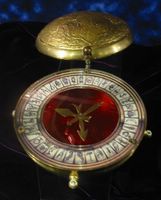His Dark Materials: The Golden Compass

The Golden Compass is the first book in a trilogy by Philip Pullman called His Dark Materials. It's a unique piece of young adult fiction in that it's just as entertaining to adults as children. I fact, when we were at B&N the other day, we found it in the Sci-Fi/Fantasy section of the adult area, not the children's' section.
I won't spoil the ending, but it's difficult to discuss this book without revealing key bits of its uniqueness. When I read it, I enjoyed the way Pullman drops the reader into his world and lets you find your footing as you read. What I'm saying is, if you don't know anything about The Golden Compass yet, then I'd feel bad if this post spoiled any part of your reading experience and maybe you should stop reading this and pick up at least the first chapter or two of the book.
Still with me, eh? I doubt anyone is ever deterred by those types of warnings.
The book centers on 11-year-old Lyra who has spent her childhood at the feet and underfoot of scholars and theologians in Oxford. But this isn't the same Oxford that you and I know. This is... Ok, depending on the reader's perception, going any further here may actually spoil the end. Let's take a different route.
The book centers on 11-year-old Lyra and her daemon. Because, of course, all humans have daemons. Lyra is fated to play an important role in the history of the world, but must act of her own will--meaning that even those who know of the prophesy about her and have an interest in it have to have faith that by sheer dumb luck she'll stumble toward her fate. Think ancient Greek drama.
Pullman crafts a decent adventure, but I felt the characters' motivations were very thin. For that reason alone, I consider this a young adult book and not an adult fiction. That's assuming children don't care or wouldn't notice that characters aren't developed and details like motivation aren't discussed in depth. Think Die Hard or any Hollywood action flick--or maybe more appropriately, the latest Lindsay Lohan atrocity. Well, maybe that shallowness isn't reserved just for children.
What makes the book great is that Pullman challenges his readers. He introduces a world that's familiar enough to get you from A to B; but he'll pass by C and make a stop at D along the way: quirks that are the stuff of everyday life to the characters but open the reader's mind. He won't settle for writing at a child's level, he writes to interest the child and carries them through the ideas and use of language to the realm of full-blown adult literature. And not just literature, but philosophy, physics, theology, and sociology. In fact, these are really what's at the heart of the story. Maybe this is what bridges the age gap: the child gets an entertaining fantasy adventure, while the adult gets the same, but loaded with thought-provoking material just under the surface.
So was this the greatest thing I've ever read? No. Did I like it? Yes--especially since it happens to touch on some out-there topics that intrigue me anyway. Would I recommend it? Yes. It'd be fun but challenging for youngsters and quick but not insipid read for adults.

0 Comments:
Post a Comment
<< Home